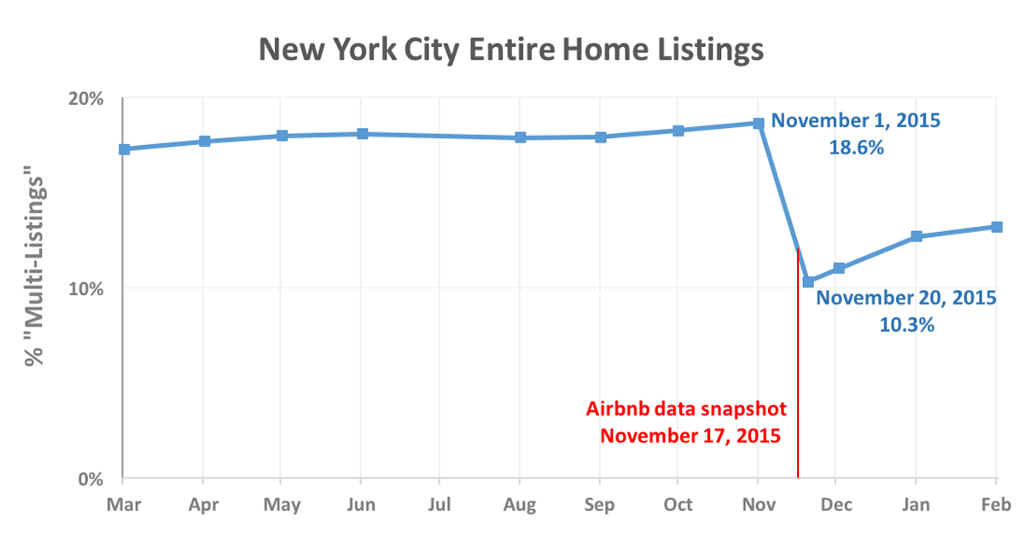The Mystery of the Thousand Missing Airbnbs

A couple of months ago, Airbnb released a batch of anonymized data about its hosts in New York City in order to show that its community “is made up of hard working families in all five boroughs who, during a time of economic inequality, depend on home sharing as an economic lifeline” and to prove, once and for all, just how transparent it really was. The illusion of transparency dissolved with little scrutiny: The release of the data was highly controlled, designed to be nearly impossible to analyze in-depth, and architected in such a way to mask just how prolific Airbnb’s most active hosts were. But it’s maybe worse than that: According to Murray Cox of Inside Airbnb and technology writer Tom Slee, the data were effectively “photoshopped” before release: “Airbnb ensured a flattering picture by carrying out a one-time targeted purge of more than 1,000 listings” in New York City.
The key statistic in the Airbnb release, which contained “anonymized information about every active Airbnb listing in New York City as of November 17, 2015” was that — contrary to fears that the service was filled with sharelords renting out multiple apartments on the service, using precious housing stock to shelter European tourists for a profit instead of city residents who need a place to live — 95 percent of its whole-home hosts shared only one listing. That number is crucial to the story that Airbnb has been telling ever more emphatically over the last year, which is that it is the vanguard of a “broader evolution in capitalism” that will save the working and middle classes from being pushed out of their homes by the forces of gentrification. And that story is more important in New York City than in most markets, because the majority of whole-home Airbnb listings — which make up some 57 percent of all Airbnb listings in New York City, according to Inside Airbnb — are straightforwardly illegal under New York State’s current short-term rental laws. (This is all discussed at length here.) That story, which rests in no small part on that number, is how Airbnb plans to legitimize itself in New York, where it faces a hostile regulatory environment.

But if Cox and Slee’s report is correct — and they have amassed a pile of data and trends over the last two years — that number has been juiced. Cox, who runs Inside Airbnb, a site that collects and analyzes data about Airbnb listings, told me that on November 1st, he and Tom Slee had identified 3,331 listings that belonged to hosts with two or more entire-home listings. Three weeks later, 1,438 of them had disappeared. Normally, Cox said, the churn from month-to-month is about two hundred such listings, “so we suspect it’s between 1,000 and 1,200 listings that went against all the trends we saw.” He continued, “There was no buildup of listings prior to November, so it’s very, very unlikely that 1,000 listings would drop off given that they’d stayed at that level for the entire year.” Airbnb, which represented the data it released in December as highly typical, had given no indication of a purge prior to release — and, according to Cox, Airbnb has said that there was no extra enforcement action on its part. So, where did all those listings go?
(Since publication, a spokesperson for Airbnb emailed the following statement: “Our community in New York has evolved to a point where 94 percent of hosts have just one listing and where there is no material presence of illegal hotels, which is why accusations from the same elected officials who called for there to be no illegal hotels on the platform and now want to fine middle class families $50,000 is akin to asking someone to walk on water and then, when they do, fining them for not swimming.” They also provided a single data table showing that on November 17th, 95 percent of hosts had just one listing; as of February 8th it had only crept down one percent, to 94 percent. Statements Airbnb provided to Recode and the Guardian refuted no further claims, and were no more illuminating.)
The report also casts doubt on how Airbnb qualified its future revenue projections at the time, when I wrote, “All that said, there’s little reason not to take Airbnb at its word that by next year the vast majority of revenue earned by whole-home shares — some eighty-six percent of it — will be earned by hosts with just one listing, who may be, by and large, members of the middle and working class.” Those projections were based on the trend that the percentage of multiple-home listings was dropping, and Cox and Slee’s report states that “the only fall in listings is just before the November 17 snapshot, when the percentage of multi-host listings plummets from almost 19 percent of the total to 10 percent.” Moreover, the number and percentage of multiple-home listings has resumed climbing, and now stands at 13 percent of the total.
Perhaps most clearly indicative of Airbnb’s intentions, though — I mean, beyond its longstanding refusal to implement any real measures to curb illegal listings or to provide the city with what it needs to do so — is that “most hosts affected by the purge were left with some ‘inventory’ on the Airbnb site, indicating that Airbnb did not kick the ‘worst actors’ off the platform.” On average, “most hosts were left with 0.8 Entire Home listings, although the three hosts with the most Entire home listings (with 10, 11 and 12 Entire Homes at November 1, 2015) lost all of their Entire home listings by November 20, 2015.”
Not that any of this matters, whether the data were completely true or slightly retouched or wholly false: Based on actual historical trends, Airbnb will continue to do what it does, aggressively expanding into new markets and growing the inventory that it has in existing ones, making the case that in order to help the middle class, we should redefine how governments enforce real estate regulation and property rights, and it will probably win most of those arguments, because who doesn’t like staying in an Airbnb or making extra money by hosting one, fully justifying Airbnb’s place as the third most valuable privately held startup on the planet, more valuable than Hilton or Marriott who are in fact playing a much smaller game than the one that Airbnb is playing (and winning), and in full transparency, my last Airbnb host was great but I did not check if to see if their listing was illegal or even if they had any others.
